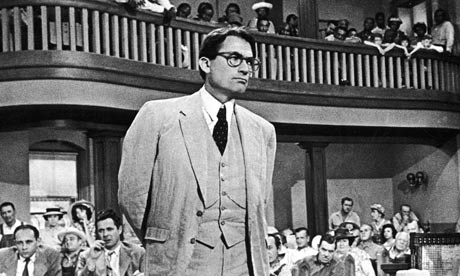
Which of these three events, all from the last week, most clearly signalled that the US election is underway?
a) Mitt Romney's decision, on Tuesday, to pool resources with the RNC.
b) Obama's decision to call out his rival by name for the first time when addressing the Newspaper Association of America on Tuesday.
c) The president's brief televised introduction of the 1962 film To Kill a Mockingbird on the USA Network channel on Saturday night.
The answer, as any seasoned politico will tell you, is the third event. The first is just economics and the second is forgotten within a news cycle. But no election is complete without movie endorsements. The election of 2008, in the end, boiled down to a battle of the Brandos: on the one hand, Marlon Brando making us an offer we couldn't refuse in The Godfather (Obama's favourite film), versus Marlon Brando in Viva Zapata! (John McCain's favourite film) making us an offer you couldn't quite understand, in a thick Mexican accent. Nothing told you more about the way the election was going than that face-off between the stealthy and the florid.
Obama's choice of the Harper Lee classic was a deft, multivalenced piece of branding-by-association. After weeks of the networks squeezing the Trayvon Martin case for the last drop of controversy, the president aligned himself with a much-loved classic whose message on race comes wrapped in a sweet nostalgia for small-town values.
Pivoting towards the election, it retrenched Obama's status as the defender of the American mainstream, evoking a blissful, pre-Palin era when "small town" and "liberalism" could be spoken in the same sentence, and no problem seemed too big that it couldn't be solved by an afternoon of sombre, sun-dappled reflection by decent, reasonable men in horn rims and seersucker suits.
"He is the protagonist for middle American aspiration, pathfinder to the straight and narrow and able to suggest a false ease and gloss that go with probity," as critic David Thompson has put it. He was writing about Gregory Peck but he could equally well be talking about Obama, who is cut from exactly the same liberal oak as Peck's Atticus Finch. "If you just learn a single trick, Scout, you'll get along a lot better with all kinds of folks," Atticus tells his daughter. "You never really understand a person until you consider things from his point of view – until you climb into his skin and walk around in it." It's pure Obama – the unrufflable paterfamilias and empath-in-chief, with his beer summits and no-drama managerial style – right down to his favoured use of the word "folks".
Every president also "plays" the president. With his looks, wit, style and beautiful wife, John F Kennedy played him as a Bond-era heart-throb, channelling what Norman Mailer called the "subterranean river of untapped, ferocious, lonely romantic desires". With his bluff self-deprecation and tough-guy one-liners ("They can run but they can't hide") Ronald Reagan played him as a reluctant High Noon-era gunslinger, a model aped by every Republican president since, from George Bush ("Hasta la vista, baby") to George Bush Jr, pantomiming Top Gun aboard the USS Abraham Lincoln in a S-3B Viking jet.
Obama has proven a judicious, if cautious, custodian of his own "brand", his election night scored with the soundtrack of the Denzel Washington football movie, Remember the Titans, his early days in office playing out as a Dave-like comedy about an outsider-come-to-Washington, complete with gee-whiz riffs on presidential helicopters and bodyguard detail. As the drama of the campaign segued into the grind of governance and Republican obstructionism, Obama has seemed at times more like a storyteller with writer's block – jammed by the dull clay of his material. But elections always favour the incumbent for narrative, as well as political reasons.
Simply put: Americans may not be ready to see this story end just yet. And everybody loves a sequel.

